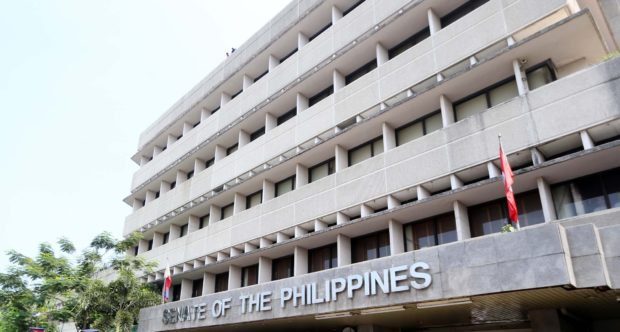Senate urged to prioritize charter change
MANILA, Philippines — The government task force on constitutional reform has called on the Senate to prioritize deliberations on economic charter change (cha-cha), pushing for a plebiscite to coincide with next year’s national elections.
The Interagency Task Force on Constitutional Reform (IATF-Core), chaired by Interior Secretary Eduardo Año, passed two resolutions last month: the first commending the House of Representatives for its adoption of Resolution of Both Houses (RHB) No. 2; and the other requesting the Senate to tackle that same resolution.
At an online press briefing on Tuesday, Jonathan Malaya, spokesperson for the Department of the Interior and Local Government (DILG), maintained that the IATF-Core resolution addressed to the Senate was “just a formality” as Senate President Vicente Sotto III has previously expressed his view of prioritizing discussions on the proposed economic amendments to the Constitution.
“The IATF-Core’s request is if the Senate can tackle this immediately before the filing of the certificates of candidacy (COCs) so it’s already passed before talks turn to politics because there’s still a long process to undergo,” he said.
The filing of COCs for next year’s local and national polls is scheduled in October.
Article continues after this advertisement“Once approved by the Senate, there may be a need for some form of bicameral [session] … and what’s most important is the plebiscite, which we hope could be held along with the 2022 elections,” he added.
Article continues after this advertisement‘Ball now in Senate’
House committee on constitutional amendments chair Alfredo Garbin Jr. said, “The ball is now in the Senate and these meaningful Constitutional reforms should not be ignored because this is not just an ordinary legislation but this is a legislation by the people, to be decided by the people.”
According to Garbin, the three priority economic legislations that President Rodrigo Duterte mentioned in his State of the Nation Address (SONA) to be prioritized — the Foreign Investments Act; the Trade Liberalization Act; and the Public Service Act — “will not be complete without constitutional amendments, the mother of all economic legislations, which is lifting the economic restrictions of the Constitution.”
One primary limitation in the Constitution that is being eyed for amendment is on foreign direct investments in public utilities.
Economic charter change, he said, would enable Congress to pass the necessary laws seen to help the country recover fully from the adverse effects of the pandemic.
Malaya pointed out that even if RBH 2 is not tackled before October, it could still be deliberated on until February or March.
The DILG spokesperson noted that the text of RBH 2 had made it clear that the charter change being sought is purely economic.
“There is no personal, political objective on the part of the proponents, particularly the members of Congress in pushing for this amendment,” he pointed out.
No political agenda
“Our hope is for the committee on constitutional amendments of the Senate to immediately call for hearings on RBH 2 so before the filing of COCs this has already been passed in the Senate,” Malaya said.
But even if RBH 2 is not adopted by the Senate before October, the IATF-Core will not give up on pushing for economic charter change. “We will continue to push this until the last session day of this Congress.”
Garbin explained that the push for a plebiscite to coincide with the 2022 national elections was to “show that there is no political agenda involved. Nobody sitting in Congress will benefit from it and instead would only benefit the public.”
Malaya added that if the RBH 2 passes the committee level by October, there could be a plenary approval by February.
But Camarines Sur Rep. Luis Raymund Villafuerte said in a statement economic charter change was already “dead” in Congress after President Duterte failed to push the measure in his last SONA.
